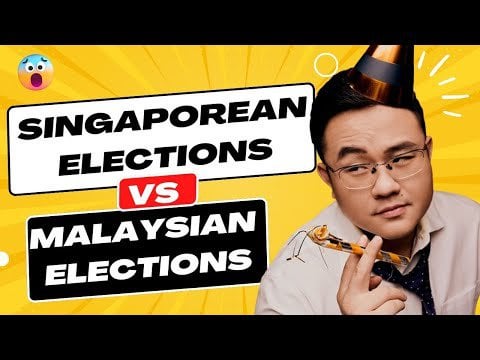Singapore Elections: A Test Of The PAP's Grip On Power

Table of Contents
The Rise of Opposition Parties and their Challenges
The Singaporean political scene is witnessing a gradual but noticeable rise of opposition parties. While the PAP has historically enjoyed overwhelming support, parties like the Workers' Party (WP) and the Progress Singapore Party (PSP) are increasingly gaining visibility and organizational strength. Their enhanced presence is reflected in more robust campaigning efforts and a more assertive articulation of alternative policy positions. However, several significant challenges remain for these opposition groups.
- Securing Funding: Opposition parties often face difficulties in securing adequate funding for their campaigns, a significant disadvantage compared to the PAP's established resources.
- Overcoming Incumbency Advantage: The PAP benefits from a considerable incumbency advantage, including established networks, access to resources, and a strong media presence.
- Navigating the Group Representation Constituency (GRC) System: The GRC system, designed to ensure minority representation, presents a considerable hurdle for opposition parties, requiring them to field teams of candidates across multi-seat constituencies. This increases the financial and logistical demands of campaigning.
- Evolving Political Discourse: Despite the challenges, the political discourse is demonstrably evolving, with increasing space for alternative viewpoints and criticisms of government policies. This shift indicates a growing appetite for a more pluralistic political environment.
Key Issues Shaping the Election
The upcoming Singapore election will be heavily influenced by several key policy issues resonating strongly with the electorate:
- Cost of Living: The rising cost of living, particularly housing and healthcare, is a major concern for many Singaporeans. This issue is likely to be a central theme during the election campaign.
- Housing Affordability: Access to affordable housing remains a significant challenge, with concerns about escalating prices and limited options for first-time homebuyers. The government's housing policies will be under intense scrutiny.
- Healthcare: Concerns about the rising cost of healthcare and the accessibility of quality medical services are likely to influence voter decisions. The efficacy and affordability of the national healthcare system will be a key area of debate.
- Social Inequality: Growing concerns about income inequality and social stratification are gaining prominence in the public discourse. Addressing social disparities will be a critical aspect of the election campaign.
- Economic Growth and Job Security: The government's economic policies and their impact on job security and economic growth are likely to be subjected to intense debate. Maintaining a strong and inclusive economy is paramount in the voters’ minds.
The Electoral System and its Influence
Singapore's unique electoral system significantly impacts the outcome of elections. Understanding its nuances is essential to comprehending the political dynamics at play.
- Group Representation Constituencies (GRCs): The GRC system, while aiming for minority representation, creates a significant advantage for the ruling party, making it challenging for opposition parties to win seats.
- Non-Constituency Members of Parliament (NCMPs): The NCMP scheme provides a limited number of seats in Parliament for the best-performing opposition candidates who did not win a constituency. This offers a degree of opposition representation, but it is a comparatively small representation.
- Electoral Boundaries: The periodic redrawing of electoral boundaries can influence the outcome, creating advantages or disadvantages for particular parties. The transparency and fairness of this process are routinely debated.
- Voting Process: While the voting process is generally considered efficient and accessible, ensuring its accessibility for all segments of the population remains a constant focus.
Predicting the Outcome and its Implications
Predicting the outcome of the Singapore election with certainty is challenging. While pre-election polls offer some indication, their accuracy remains debatable. Several potential scenarios are possible:
- A Landslide Victory for the PAP: This would maintain the status quo, with limited changes to the government's policies and approach.
- A Reduced Majority for the PAP: This would signal a shift in public sentiment, potentially prompting the PAP to reassess its policies and approach.
- Increased Opposition Representation: This could lead to a more robust parliamentary debate and a greater range of perspectives represented in policymaking.
Regardless of the outcome, the election will have significant implications for Singapore's political landscape:
- Policy Changes: Depending on the outcome, we could see shifts in government policies addressing the concerns of voters.
- Political Stability: While Singapore generally enjoys political stability, the election results will influence the level of confidence and stability moving forward.
- Government Reforms: The election results may spur the government to implement reforms in areas such as the electoral system or social welfare policies.
Conclusion:
The Singapore elections are not merely a procedural exercise; they represent a critical test of the PAP's long-standing dominance. The emergence of stronger opposition parties, coupled with intensifying public concerns about key socio-economic issues, creates an environment ripe for change and a pivotal moment in Singaporean political history. Understanding the intricacies of the electoral system, the key policy issues at stake, and the potential implications of various outcomes is crucial for any observer interested in the future of Singapore. Engage actively in this Singapore election, make your voice heard, and help shape the direction of your nation. Your participation is vital in this pivotal moment for Singaporean democracy.

Featured Posts
-
 Las Vegas Golden Knights A Strong Stanley Cup Bid
May 05, 2025
Las Vegas Golden Knights A Strong Stanley Cup Bid
May 05, 2025 -
 Bgt Stars Last Minute Withdrawal Leaves Simon Cowell Livid
May 05, 2025
Bgt Stars Last Minute Withdrawal Leaves Simon Cowell Livid
May 05, 2025 -
 Esc 2025 Who Will Sing For Germany Eurovision 2024 Show 1
May 05, 2025
Esc 2025 Who Will Sing For Germany Eurovision 2024 Show 1
May 05, 2025 -
 Great Leslies Eurovision Continued Success
May 05, 2025
Great Leslies Eurovision Continued Success
May 05, 2025 -
 Updated Ufc 314 Fight Card Impact Of Prates Vs Neal Cancellation
May 05, 2025
Updated Ufc 314 Fight Card Impact Of Prates Vs Neal Cancellation
May 05, 2025
